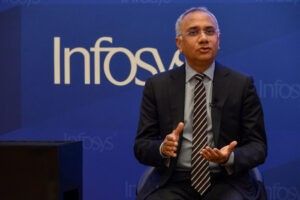- Tuesday, May 14, 2024
Business leaders back report citing Delhi’s bid to become world’s third-largest economy

By: Amit Roy
BRITISH INDIAN leaders have welcomed a glowing report which recommends India as the ideal country for foreign investment.
Ian Cowie, in his “Personal Account” column in the Sunday Times (28), wrote: “The country is bidding to become the world’s third-biggest economy and I think it’s a great time to join the gravy train.”
He added: “With voting under way by the world’s largest electorate of 968 million people, international investors should consider India’s bid to become the world’s third-biggest economy within three years.
“If that aim sounds ambitious, bear in mind that when its prime minister, Narendra Modi, came to power a decade ago, the country ranked ninth by the gross domestic product (GDP) measure of economic output.
“Since then, India has overtaken Canada, Russia, France and the United Kingdom to rank fifth, according to the World Bank. Now, with the investment bank Goldman Sachs estimating economic growth at six per cent a year, another bank, Jefferies, predicts that India will surpass Germany and Japan by 2027.”
Cowie added: “Modi’s militant Hindu nationalism has its critics, not least among India’s Muslim minority, but there can be no doubt that his government has modernised the vast subcontinent.
“For example, the country has issued digital identification to 1.3 billion of its 1.44 billion people. This 12-digit ID can be cross-referenced with biometric information, including fingerprints, iris scans and a facial photograph held in a government database.
“Known as ‘Aadhaar’ – foundation in Hindi – this system enables 80 per cent of the adult population to have bank accounts and participate as consumers and entrepreneurs in the world’s fifth-largest electronic payments system.

“Families who gained from the wealth creation that this digital infrastructure enabled include our own prime minister, Rishi Sunak, and his wife, Akshata Murty. Her father, Narayana Murthy, co-founded the Bangalore-based information technology group Infosys, and she has a shareholding that paid her £13.5 million dividend income last year.”
Cowie points out that compared with China, “India is benefiting as global companies including Apple and Tesla favour doing business in a democracy with an independent judiciary to protect property rights; unlike a dictatorship where wealth can be confiscated in an instant”.
Responding to Cowie’s findings, Lord Jitesh Gadhia, a member of the Court of the Bank of England which governs the institution, said: “Other than a couple of snide remarks and low blows, I think the article is highlighting the rewards for long-term patient investment in India.
“Of course, it’s not been a one-way bet, and there have been periods when the Indian market has been out of favour and/or the depreciation of the rupee has wiped out any gains. Historic research also shows that investing in the fastestgrowing economies doesn’t always generate the best stock-market returns.
“The lesson is to be well-diversified, making regular investments over a long period of time, rather than making speculative investments and timing the market.”
Lord Karan Bilimoria, former president of the Confederation of British Industry, told Eastern Eye: “I did, in fact, read this excellent article highlighting India as such a good investment opportunity, and will increasingly be in the future. The world is continually waking up to India’s phenomenal potential. It is an emerging global economic super power.”
Eastern Eye also consulted Dinesh Dhamija, who put his personal story into his debut book, Book It! How Dinesh Dhamija built and sold online travel agency ebookers for £247 million.
His new book, published earlier this year, is The Indian Century, in which he set out why he thinks the 30 millionstrong Indian diaspora across the world – but especially 2.5 million British Indians – should invest in the mother country.
He argued that the new Indian government which comes to power after the general election should continue to pursue reforms.
“This economic uplift needs to go on for a trickle-down effect to ordinary people – 300 million to 400 million people do not have electricity or running water. This is the first priority in my mind. India then needs to pivot to social harmony,” Dhamija explained.